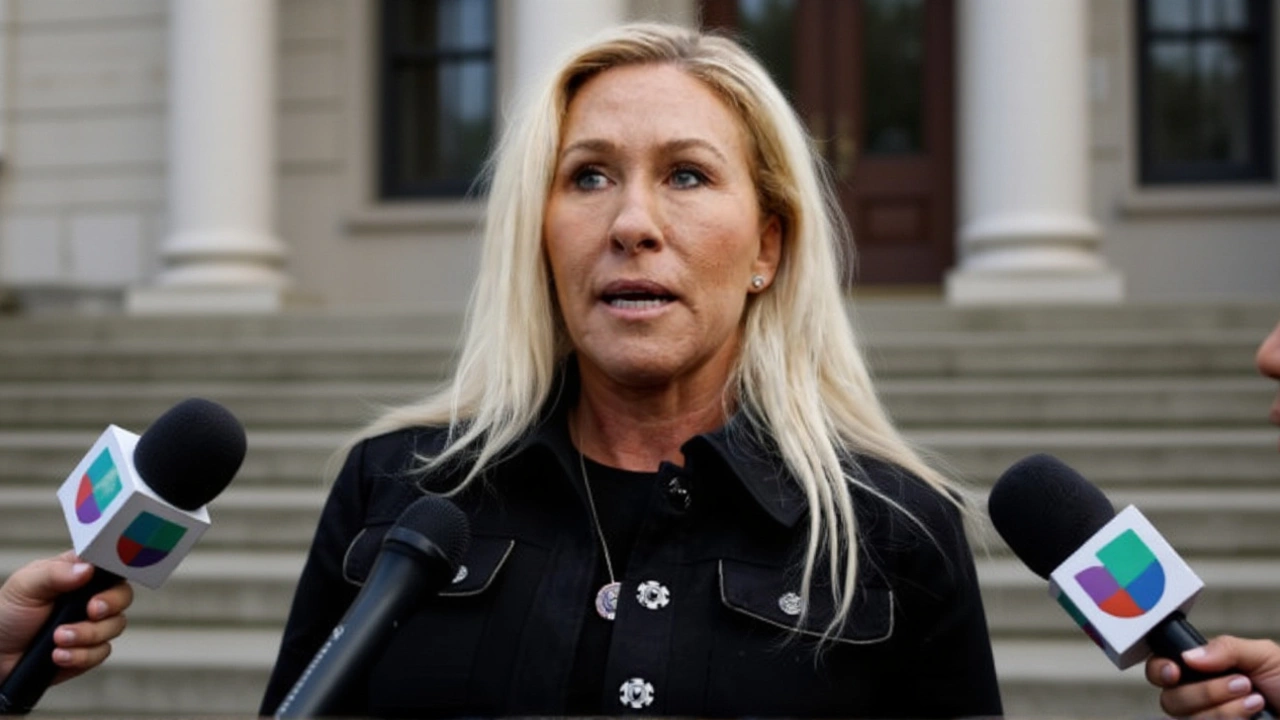One day after announcing she would leave Congress to avoid a bitter primary fight, Marjorie Taylor Greene found herself branded a traitor by the man she once called her political north star: Donald Trump. The public rupture, unfolding on Saturday, November 22, 2025, marked the violent end of a alliance that had defined the far right’s rise in the U.S. House of Representatives since 2021. Greene, the fiery Republican from Georgia's 14th congressional district, had spent four years as Trump’s most loyal congressional voice — until he turned on her. And she responded not with anger, but with dignity.
The Breakdown of a MAGA Power Duo
For years, Marjorie Taylor Greene was the embodiment of Trump’s populist fury in Congress. Elected in 2020 and sworn in on January 3, 2021, she quickly became a fixture at rallies, a relentless defender of Trump’s 2020 election claims, and a leading voice in the House Freedom Caucus. Her district — a sprawling 13,065 square miles covering nine northern Georgia counties including Rome, Dalton, and Marietta — was a MAGA stronghold. She didn’t just represent it; she amplified its rage. But last week, something changed. Trump, in a series of cryptic social media posts between November 16 and 22, 2025, launched what insiders called “a sharp criticism” of Greene — not on policy, but on loyalty. He questioned her effectiveness, her messaging, and, implicitly, her commitment to his legacy."I Have Too Much Self-Respect"
Greene didn’t retaliate with a tweet storm. Instead, on the morning of November 22, 2025, she posted a message that stunned even her allies: “I HAVE TOO MUCH SELF-RESPECT AND DIGNITY… I LOVE MY FAMILY WAY TOO MUCH, AND I DO NOT WANT MY SWEET DISTRICT TO HAVE TO ENDURE A HURTFUL AND HATEFUL PRIMARY AGAINST ME BY THE PRESIDENT THAT WE ALL FOUGHT FOR.” The phrase “my sweet district” echoed like a lullaby — tender, personal, almost heartbreaking. It wasn’t just about avoiding a primary. It was about protecting the people who’d put her there from the very machine she helped build. She didn’t name Trump directly, but the subtext was unmistakable. Minutes later, Trump responded. His post, brief and brutal, called her a “traitor.” No explanation. No nuance. Just a label.What Happened to the Loyalist?
The shift was seismic. Greene had once called Trump “the greatest president in American history.” She’d defended him during impeachment, stood by him during the Capitol riot investigations, and even pushed for his pardons. But something had worn thin. By November 2025, she was no longer just a loyalist — she was a liability in Trump’s eyes. Sources close to the former president suggest he viewed her as too volatile, too polarizing, even for his base. Others say it was about control. Trump doesn’t tolerate dissent, even from those who’ve served him faithfully. Greene’s resignation wasn’t just an exit — it was a quiet rebellion. Her follow-up post that same day — “THERE ARE NO LEADERS THAT WILL SAVE THIS COUNTRY. BUT YOU, THE AMERICAN PEOPLE, CAN” — felt less like a farewell and more like a manifesto. She was handing power back to voters. Not to another politician. Not to a movement. To the people.
What This Means for Georgia’s 14th
Greene’s resignation, effective January 2026, triggers a special election during the second session of the 119th United States CongressWashington, D.C.. The seat is a Republican stronghold, but the field is wide open. Will Trump back a candidate? If so, who? And will voters in Carroll, Floyd, Bartow, Gordon, Murray, Whitfield, Union, Towns, and Fannin counties still rally behind Trump’s chosen successor — or have they grown tired of the infighting? The district’s 2022 election saw Greene win with 71% of the vote. But that was before the cracks appeared. Now, the question isn’t just who wins — it’s whether the MAGA brand still carries the same weight.Why This Matters Beyond Georgia
This isn’t just about one congresswoman quitting. It’s about the unraveling of Trump’s control over his own movement. For years, he ruled the GOP through fear, loyalty tests, and primary threats. Greene’s resignation — and Trump’s response — shows that even his most devoted allies are beginning to say: enough. Her move could inspire others. It signals that the cost of staying loyal may now outweigh the reward. And in a political system where loyalty is currency, that’s dangerous for any leader. Trump’s “traitor” label backfired. It didn’t silence Greene — it elevated her. She didn’t lose the fight. She walked away from it.
What’s Next?
The special election for Georgia’s 14th district will likely be held in March or April 2026, with the winner serving the remainder of the term through January 3, 2027. Expect Trump to endorse someone — possibly a former state legislator or a Trump-endorsed county official. But Greene’s exit has already reshaped the landscape. Her final message — that the American people must save the country — is now a rallying cry for independents and disillusioned Republicans alike. Meanwhile, Trump’s team is reportedly preparing for a brutal primary season in 2026, with Georgia’s 14th as a key battleground. But the ghost of Marjorie Taylor Greene looms large: she proved you can leave without begging for forgiveness.Frequently Asked Questions
Why did Marjorie Taylor Greene resign from Congress?
Greene resigned to avoid a bitter primary challenge from Donald Trump, whom she once fiercely supported. In her November 22, 2025 statement, she said she couldn’t bear to see her district endure a “hurtful and hateful primary” against her — a direct reference to Trump’s growing hostility. She cited self-respect, family, and protection of her constituents as her reasons.
When will the special election for Georgia’s 14th district take place?
The special election is expected in March or April 2026, ahead of the formal start of the 120th Congress on January 3, 2027. The winner will serve the remainder of Greene’s term, which ends in January 2027. Georgia law requires the governor to call the election within 45 days of the vacancy being certified, which is expected shortly after January 20, 2026.
Is Donald Trump likely to endorse a candidate in the special election?
Yes. Trump has already signaled his intent to control the GOP’s future through primaries. While no official endorsement has been made, insiders say he’s already vetting potential candidates — likely loyalists from Georgia’s Republican Party or former state legislators who’ve pledged allegiance to him. His endorsement will be decisive, but Greene’s departure has weakened his grip on the district’s voters.
What does Greene’s resignation mean for Trump’s political influence?
It’s a major blow. Greene was one of his most visible and aggressive congressional allies. Her public exit — and his “traitor” label — expose fractures in his base. Voters may now question whether loyalty to Trump comes at too high a cost. Her final message — empowering the people over leaders — could inspire others to challenge Trump’s dominance, even within his own party.
How did the media report this event?
CBS Chicago provided the most detailed account, relying solely on direct social media posts from both Trump and Greene. They confirmed the timeline: Trump’s criticism (Nov 16–22), Greene’s resignation announcement (Nov 22 morning), Trump’s “traitor” post (same morning), and Greene’s closing message (later that day). No polling, expert analysis, or third-party commentary was included — just the raw sequence of events.
What’s the significance of Greene calling her district her “sweet district”?
The phrase humanized her in a way she rarely did before. Instead of invoking ideology or outrage, she spoke of love and protection — for her family and her community. It signaled she was leaving not out of defeat, but out of moral conviction. That emotional tone resonated far beyond Georgia, turning her resignation into a symbolic moment of quiet resistance against political toxicity.



